TED演讲:二十岁是不可以挥霍的光阴
(完整版)TED英语演讲稿:二十岁是不可以挥霍的光阴
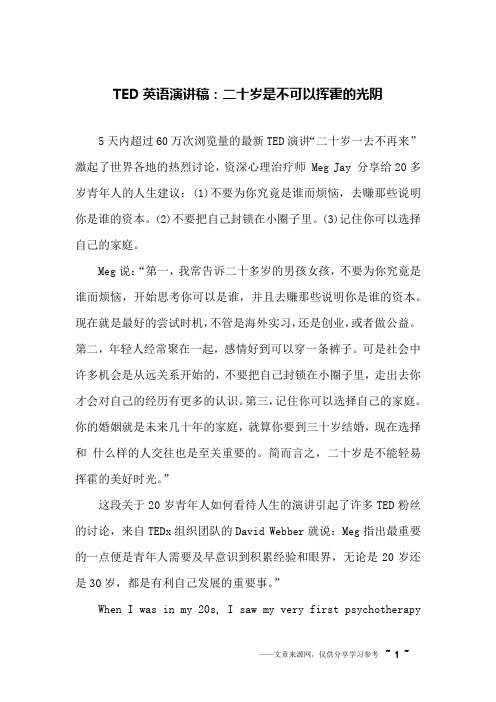
TED英语演讲稿:二十岁是不可以挥霍的光阴5天内超过60万次浏览量的最新TED演讲“二十岁一去不再来”激起了世界各地的热烈讨论,资深心理治疗师 Meg Jay 分享给20多岁青年人的人生建议:(1)不要为你究竟是谁而烦恼,去赚那些说明你是谁的资本。
(2)不要把自己封锁在小圈子里。
(3)记住你可以选择自己的家庭。
Meg说:“第一,我常告诉二十多岁的男孩女孩,不要为你究竟是谁而烦恼,开始思考你可以是谁,并且去赚那些说明你是谁的资本。
现在就是最好的尝试时机,不管是海外实习,还是创业,或者做公益。
第二,年轻人经常聚在一起,感情好到可以穿一条裤子。
可是社会中许多机会是从远关系开始的,不要把自己封锁在小圈子里,走出去你才会对自己的经历有更多的认识。
第三,记住你可以选择自己的家庭。
你的婚姻就是未来几十年的家庭,就算你要到三十岁结婚,现在选择和什么样的人交往也是至关重要的。
简而言之,二十岁是不能轻易挥霍的美好时光。
”这段关于20岁青年人如何看待人生的演讲引起了许多TED粉丝的讨论,来自TEDx组织团队的David Webber就说:Meg指出最重要的一点便是青年人需要及早意识到积累经验和眼界,无论是20岁还是30岁,都是有利自己发展的重要事。
”When I was in my 20s, I saw my very first psychotherapyclient. I was a Ph.D. student in clinical psychology at Berkeley. She was a 26-year-old woman named Alex.记得见我第一位心理咨询顾客时,我才20多岁。
当时我是Berkeley临床心理学在读博士生。
我的第一位顾客是名叫Alex的女性,26岁。
Now Alex walked into her first session wearing jeans and a big slouchy top, and she dropped onto the couch in my office and kicked off her flats and told me she was there to talk about guy problems. Now when I heard this, I was so relieved. My classmate got an arsonist for her first client. (Laughter) And I got a twentysomething who wanted to talk about boys. This I thought I could handle.第一次见面Alex穿着牛仔裤和宽松上衣走进来,她一下子栽进我办公室的沙发上,踢掉脚上的平底鞋,跟我说她想谈谈男生的问题。
TED英语演讲稿启迪心灵,引领不可挥霍的二十岁光阴
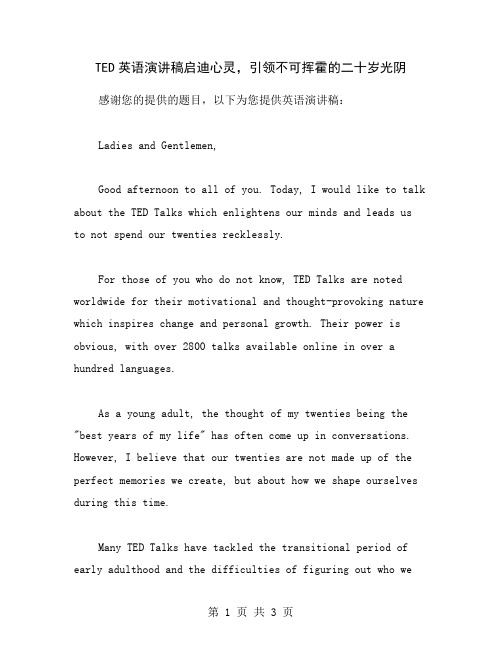
TED英语演讲稿启迪心灵,引领不可挥霍的二十岁光阴感谢您的提供的题目,以下为您提供英语演讲稿:Ladies and Gentlemen,Good afternoon to all of you. Today, I would like to talk about the TED Talks which enlightens our minds and leads usto not spend our twenties recklessly.For those of you who do not know, TED Talks are noted worldwide for their motivational and thought-provoking nature which inspires change and personal growth. Their power is obvious, with over 2800 talks available online in over a hundred languages.As a young adult, the thought of my twenties being the "best years of my life" has often come up in conversations. However, I believe that our twenties are not made up of the perfect memories we create, but about how we shape ourselves during this time.Many TED Talks have tackled the transitional period of early adulthood and the difficulties of figuring out who weare and the direction we want to take. One that comes to mind is Meg Jay's talk "Why 30 is not the new 20". She shares how our twenties are crucial to our development, and it is notthe time to live nonchalantly or think that we have all the time in the world.Another talk to take a look at is Chimamanda NgoziAdichie's "The Danger of a Single Story". Adichie encouragesus to embrace diversity and resist stereotypes. This talk encourages us to broaden our mind and form connections with those who are different from us.When it comes to planning our lives, there is a TED Talk titled "How to know your life purpose in 5 minutes" by Adam Leipzig. While it's not entirely possible to figure outlife's purpose in five minutes, the video's application of personal and professional experiences aids one in mapping out and realizing personal goals.When we are young, we have time to take chances, make mistakes, and learn from them. Success doesn't come overnight, and it takes many failures to get there. Another excitingtalk is "The Art of Being Yourself" by Caroline McHugh. McHugh examines why we live in fear of embracing our trueselves and how we limit our potential in the process. She reminds us that the most important individual we need to impress in life is ourselves.To sum it up, TED Talks are vital in shaping your personal and professional goals while helping you explore the world through the wisdom of diverse voices. From finding your purpose to realizing your potential, and from embracing your unique qualities to connecting with those who are different, TED Talks inspires us in every aspect of growth.The twenties are not an era we cannot afford to waste, and with the aid of TED Talks, we will find that life is too short to live it without substance. We should think of our twenties as the foundation of a bright future that we build one day at a time.Thank you for listening.。
青春励志演讲稿:二十几岁不可挥霍的光阴
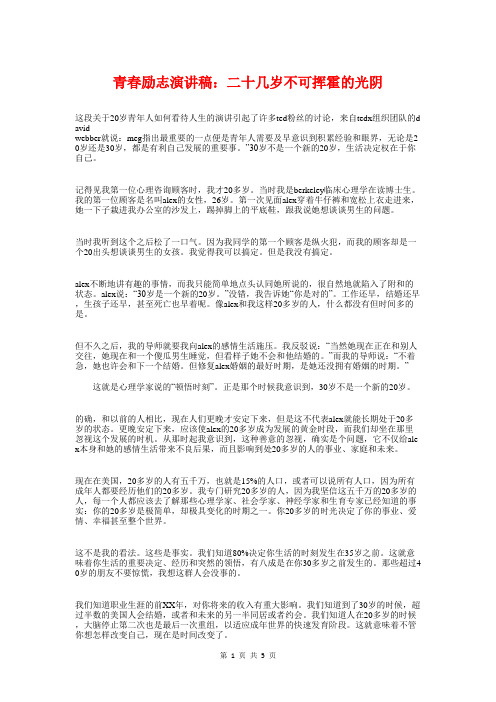
青春励志演讲稿:二十几岁不可挥霍的光阴这段关于20岁青年人如何看待人生的演讲引起了许多ted粉丝的讨论,来自tedx组织团队的d avidwebber就说:meg指出最重要的一点便是青年人需要及早意识到积累经验和眼界,无论是2 0岁还是30岁,都是有利自己发展的重要事。
”30岁不是一个新的20岁,生活决定权在于你自己。
记得见我第一位心理咨询顾客时,我才20多岁。
当时我是berkeley临床心理学在读博士生。
我的第一位顾客是名叫alex的女性,26岁。
第一次见面alex穿着牛仔裤和宽松上衣走进来,她一下子栽进我办公室的沙发上,踢掉脚上的平底鞋,跟我说她想谈谈男生的问题。
当时我听到这个之后松了一口气。
因为我同学的第一个顾客是纵火犯,而我的顾客却是一个20出头想谈谈男生的女孩。
我觉得我可以搞定。
但是我没有搞定。
alex不断地讲有趣的事情,而我只能简单地点头认同她所说的,很自然地就陷入了附和的状态。
alex说:“30岁是一个新的20岁。
”没错,我告诉她“你是对的”。
工作还早,结婚还早,生孩子还早,甚至死亡也早着呢。
像alex和我这样20多岁的人,什么都没有但时间多的是。
但不久之后,我的导师就要我向alex的感情生活施压。
我反驳说:“当然她现在正在和别人交往,她现在和一个傻瓜男生睡觉,但看样子她不会和他结婚的。
”而我的导师说:“不着急,她也许会和下一个结婚。
但修复alex婚姻的最好时期,是她还没拥有婚姻的时期。
”这就是心理学家说的“顿悟时刻”。
正是那个时候我意识到,30岁不是一个新的20岁。
的确,和以前的人相比,现在人们更晚才安定下来,但是这不代表alex就能长期处于20多岁的状态。
更晚安定下来,应该使alex的20多岁成为发展的黄金时段,而我们却坐在那里忽视这个发展的时机。
从那时起我意识到,这种善意的忽视,确实是个问题,它不仅给ale x本身和她的感情生活带来不良后果,而且影响到处20多岁的人的事业、家庭和未来。
TED英语演讲稿:二十几岁不可挥霍的光阴

TED英语演讲稿:二十几岁不可挥霍的光阴wheniwasinmy20s,isawmyveryfirstpsychotherapyclient.iw asaph.d.studentinclinicalpsychologyatberkeley.shewasa 26-year-oldwomannamedalex.nowalexwalkedintoherfirstsessionwea ringjeansandabigslouchytop,andshedroppedontothecouchi nmyofficeandkickedoffherflatsandtoldmeshewastheretota lkaboutguyproblems.nowwheniheardthis,iwassorelieved.m yclassmategotanarsonistforherfirstclient.(laughter)an digotatwentysomethingwhowantedtotalkaboutboys.thisith oughticouldhandle.butididn’thandleit.withthefunnystoriesthatalexwouldb ringtosession,itwaseasyformejusttonodmyheadwhilewekic kedthecandowntheroad.”thirty’sthenew20,”alexwoulds ay,andasfarasicouldtell,shewasright.workhappenedlater ,marriagehappenedlater,kidshappenedlater,evendeathhap penedlater.twentysomethingslikealexandihadnothingbutt ime.butbeforelong,mysupervisorpushedmetopushalexaboutherl ovelife.ipushedback.isaid,”sure,she’sdatingdown,she’ssleepingwithaknuc klehead,butit’snotlikeshe’sgoingtomarrytheguy.”andthenmysupervisorsaid,”notyet,butshemightmarrythen extone.besides,thebesttimetoworkonalex’smarriageisbe foreshehasone.”that’swhatpsychologistscallan”aha!”moment.thatwast hemomentirealized,30isnotthenew20.yes,peoplesettledow nlaterthantheyusedto,butthatdidn’tmakealex’s20sadev elopmentaldowntime.thatmadealex’s20sadevelopmentalsw eetspot,andweweresittingthereblowingit.thatwaswhenire alizedthatthissortofbenignneglectwasarealproblem,andi thadrealconsequences,notjustforalexandherlovelifebutf orthecareersandthefamiliesandthefuturesoftwentysometh ingseverywhere.thereare50milliontwentysomethingsintheunitedstatesrig htnow.we’retalkingabout15percentofthepopulation,or10 0percentifyouconsiderthatnoone’sgettingthroughadulth oodwithoutgoingthroughtheir20sfirst.raiseyourhandifyou’reinyour20s.ireallywanttoseesomet wentysomethingshere.oh,yay!y’all’sawesome.ifyouwork withtwentysomethings,youloveatwentysomething,you’rel osingsleepovertwentysomethings,iwanttosee—okay.awesome,twentysomethingsreallymatter.soispecializeintwentysomethingsbecauseibelievethateve rysingleoneofthose50milliontwentysomethingsdeservesto knowwhatpsychologists,sociologists,neurologistsandfer tilityspecialistsalreadyknow:thatclaimingyour20sisone ofthesimplest,yetmosttransformative,thingsyoucandofor work,forlove,foryourhappiness,maybeevenfortheworld.thisisnotmyopinion.thesearethefacts.weknowthat80perce ntoflife’smostdefiningmomentstakeplacebyage35.thatmeansthateightoutof10ofthedecisionsandexperiencesand”a ha!”momentsthatmakeyourlifewhatitiswillhavehappenedb yyourmid-30s.peoplewhoareover40,don’tpanic.thiscrowdisgoingto befine,ithink.weknowthatthefirst10yearsofacareerhasan exponentialimpactonhowmuchmoneyyou’regoingtoearn.wek nowthatmorethanhalfofamericansaremarriedorarelivingwi thordatingtheirfuturepartnerby30.weknowthatthebrainca psoffitssecondandlastgrowthspurtinyour20sasitrewiresi tselfforadulthood,whichmeansthatwhateveritisyouwantto changeaboutyourself,nowisthetimetochangeit.weknowthat personalitychangesmoreduringyour20sthanatanyothertime inlife,andweknowthatfemalefertilitypeaksatage28,andth ingsgettrickyafterage35.soyour20sarethetimetoeducatey ourselfaboutyourbodyandyouroptions.sowhenwethinkaboutchilddevelopment,weallknowthatthefi rstfiveyearsareacriticalperiodforlanguageandattachmen tinthebrain.it’satimewhenyourordinary,day-to-daylifehasaninordinateimpactonwhoyouwillbecome.butwha twehearlessaboutisthatthere’ssuchathingasadultdevelo pment,andour20sarethatcriticalperiodofadultdevelopmen t.butthisisn’twhattwentysomethingsarehearing.newspaper stalkaboutthechangingtimetableofadulthood.researchers callthe20sanextendedadolescence.journalistscoinsillyn icknamesfortwentysomethingslike”twixters”and”kidul ts.”it’strue.asaculture,wehavetrivializedwhatisactu allythedefiningdecadeofadulthood.leonardbernsteinsaidthattoachievegreatthings,youneeda planandnotquiteenoughtime.isn’tthattrue?sowhatdoyout hinkhappenswhenyoupatatwentysomethingontheheadandyous ay,”youhave10extrayearstostartyourlife”?nothinghapp ens.youhaverobbedthatpersonofhisurgencyandambition,an dabsolutelynothinghappens.andtheneveryday,smart,interestingtwentysomethingslike youorlikeyoursonsanddaughterscomeintomyofficeandsayth ingslikethis:”iknowmyboyfriend’snogoodforme,butthis relationshipdoesn’tcount.i’mjustkillingtime.”orthe ysay,”everybodysaysaslongasigetstartedonacareerbythe timei’m30,i’llbefine.”butthenitstartstosoundlikethis:”my20sarealmostover,a ndihavenothingtoshowformyself.ihadabetterrésuméthedayafterigraduatedfromcollege.”andthenitstartstosoundlikethis:”datinginmy20swaslike musicalchairs.everybodywasrunningaroundandhavingfun,b utthensometimearound30itwaslikethemusicturnedoffandev erybodystartedsittingdown.ididn’twanttobetheonlyonel eftstandingup,sosometimesithinkimarriedmyhusbandbecau sehewastheclosestchairtomeat30.”wherearethetwentysomethingshere?donotdothat.okay,nowthatsoundsalittleflip,butmakenomistake,thesta kesareveryhigh.whenalothasbeenpushedtoyour30s,thereis enormousthirtysomethingpressuretojump-startacareer,pickacity,partnerup,andhavetwoorthreekidsinamuchshorterperiodoftime.manyofthesethingsareincom patible,andasresearchisjuststartingtoshow,simplyharde randmorestressfultodoallatonceinour30s.thepost-millennialmidlifecrisisisn’tbuyingaredsportscar.it’srealizingyoucan’thavethatcareeryounowwant.it’sreal izingyoucan’thavethatchildyounowwant,oryoucan’tgive yourchildasibling.toomanythirtysomethingsandfortysome thingslookatthemselves,andatme,sittingacrosstheroom,a ndsayabouttheir20s,”whatwasidoing?whatwasithinking?”iwanttochangewhattwentysomethingsaredoingandthinking.here’sastoryabouthowthatcango.it’sastoryaboutawoman namedemma.at25,emmacametomyofficebecauseshewas,inherw ords,havinganidentitycrisis.shesaidshethoughtshemight liketoworkinartorentertainment,butshehadn’tdecidedye t,soshe’dspentthelastfewyearswaitingtablesinstead.be causeitwascheaper,shelivedwithaboyfriendwhodisplayedh istempermorethanhisambition.andashardasher20swere,her earlylifehadbeenevenharder.sheoftencriedinoursessions ,butthenwouldcollectherselfbysaying,”youcan’tpickyo urfamily,butyoucanpickyourfriends.”welloneday,emmacomesinandshehangsherheadinherlap,ands hesobbedformostofthehour.she’djustboughtanewaddressb ook,andshe’dspentthemorningfillinginhermanycontacts, butthenshe’dbeenleftstaringatthatemptyblankthatcomes afterthewords”incaseofemergency,pleasecall....”shew asnearlyhystericalwhenshelookedatmeandsaid,”who’sgoingtobethereformeifigetinacarwreck?who’sgoingtotakec areofmeifihavecancer?”nowinthatmoment,ittookeverythingihadnottosay,”iwill.”butwhatemmaneededwasn’tsometherapistwhoreally,real lycared.emmaneededabetterlife,andiknewthiswasherchanc e.ihadlearnedtoomuchsinceifirstworkedwithalextojustsi ttherewhileemma’sdefiningdecadewentparadingby.sooverthenextweeksandmonths,itoldemmathreethingsthate verytwentysomething,maleorfemale,deservestohear.first,itoldemmatoforgetabouthavinganidentitycrisisand getsomeidentitycapital.bygetidentitycapital,imeandoso methingthataddsvaluetowhoyouare.dosomethingthat’sani nvestmentinwhoyoumightwanttobenext.ididn’tknowthefut ureofemma’scareer,andnooneknowsthefutureofwork,butid oknowthis:identitycapitalbegetsidentitycapital.sonowi sthetimeforthatcross-countryjob,thatinternship,thatstartupyouwanttotry.i’mnotdiscountingtwentysomethingexplorationhere,butiamd iscountingexplorationthat’snotsupposedtocount,which, bytheway,isnotexploration.that’sprocrastination.itol demmatoexploreworkandmakeitcount.second,itoldemmathattheurbantribeisoverrated.bestfrie ndsaregreatforgivingridestotheairport,buttwentysometh ingswhohuddletogetherwithlike-mindedpeerslimitwhotheyknow,whattheyknow,howtheythink ,howtheyspeak,andwheretheywork.thatnewpieceofcapital, thatnewpersontodatealmostalwayscomesfromoutsidetheinnercircle.newthingscomefromwhatarecalledourweakties,ou rfriendsoffriendsoffriends.soyes,halfoftwentysomethin gsareun-orunder-employed.buthalfaren’t,andweaktiesarehowyougetyourse lfintothatgroup.halfofnewjobsareneverposted,soreachin gouttoyourneighbor’sbossishowyougetthatun-postedjob.it’snotcheating.it’sthescienceofhowinform ationspreads.lastbutnotleast,emmabelievedthatyoucan’tpickyourfami ly,butyoucanpickyourfriends.nowthiswastrueforhergrowi ngup,butasatwentysomething,soonemmawouldpickherfamily whenshepartneredwithsomeoneandcreatedafamilyofherown. itoldemmathetimetostartpickingyourfamilyisnow.nowyoum aybethinkingthat30isactuallyabettertimetosettledownth an20,oreven25,andiagreewithyou.butgrabbingwhoeveryou ’relivingwithorsleepingwithwheneveryoneonfacebooksta rtswalkingdowntheaisleisnotprogress.thebesttimetowork onyourmarriageisbeforeyouhaveone,andthatmeansbeingasi ntentionalwithloveasyouarewithwork.pickingyourfamilyi saboutconsciouslychoosingwhoandwhatyouwantratherthanj ustmakingitworkorkillingtimewithwhoeverhappenstobecho osingyou.sowhathappenedtoemma?well,wewentthroughthataddressboo k,andshefoundanoldroommate’scousinwhoworkedatanartmu seuminanotherstate.thatweaktiehelpedhergetajobthere.t hatjoboffergaveherthereasontoleavethatlive-inboyfriend.now,fiveyearslater,she’saspecialeventspl annerformuseums.she’smarriedtoamanshemindfullychose. sheloveshernewcareer,sheloveshernewfamily,andshesentmeacardthatsaid,”nowtheemergencycontactblanksdon’tse embigenough.”nowemma’sstorymadethatsoundeasy,butthat’swhatilovea boutworkingwithtwentysomethings.theyaresoeasytohelp.t wentysomethingsarelikeairplanesjustleavinglax,boundfo rsomewherewest.rightaftertakeoff,aslightchangeincours eisthedifferencebetweenlandinginalaskaorfiji.likewise ,at21or25oreven29,onegoodconversation,onegoodbreak,on egoodtedtalk,canhaveanenormouseffectacrossyearsandeve ngenerationstocome.sohere’sanideaworthspreadingtoeverytwentysomethingyo uknow.it’sassimpleaswhatilearnedtosaytoalex.it’swha tinowhavetheprivilegeofsayingtotwentysomethingslikeem maeverysingleday:thirtyisnotthenew20,soclaimyouradult hood,getsomeidentitycapital,useyourweakties,pickyourf amily.don’tbedefinedbywhatyoudidn’tknowordidn’tdo. you’redecidingyourliferightnow.thankyou.(applause) 译文、记得见我第一位心理咨询顾客时,我才20多岁。
【最新文档】TED英语演讲稿:二十几岁不可挥霍的光阴(附翻译)-实用word文档 (9页)

本文部分内容来自网络整理,本司不为其真实性负责,如有异议或侵权请及时联系,本司将立即删除!== 本文为word格式,下载后可方便编辑和修改! ==TED英语演讲稿:二十几岁不可挥霍的光阴(附翻译)when i was in my 20s, i saw my very first psychotherapy client. i was a ph.d. student in clinical psychology at berkeley. she was a 26-year-old woman named alex. now alex walked into her first session wearing jeans and a big slouchy top, and she dropped onto the couchin my office and kicked off her flats and told me she was there totalk about guy problems. now when i heard this, i was so relieved. my classmate got an arsonist for her first client. (laughter) and i gota twentysomething who wanted to talk about boys. this i thought icould handle.but i didn't handle it. with the funny stories that alex wouldbring to session, it was easy for me just to nod my head while we kicked the can down the road. "thirty's the new 20," alex would say, and as far as i could tell, she was right. work happened later, marriage happened later, kids happened later, even death happened later. twentysomethings like alex and i had nothing but time.but before long, my supervisor pushed me to push alex about her love life. i pushed back.i said, "sure, she's dating down, she's sleeping with a knucklehead, but it's not like she's going to marry the guy."and then my supervisor said, "not yet, but she might marry thenext one. besides, the best time to work on alex's marriage is before she has one."that's what psychologists call an "aha!" moment. that was the moment i realized, 30 is not the new 20. yes, people settle downlater than they used to, but that didn't make alex's 20s a developmental downtime. that made alex's 20s a developmental sweet spot, and we were sitting there blowing it. that was when i realized that this sort of benign neglect was a real problem, and it had real consequences, not just for alex and her love life but for the careers and the families and the futures of twentysomethings everywhere.there are 50 million twentysomethings in the united states right now. we're talking about 15 percent of the population, or 100 percent if you consider that no one's getting through adulthood without going through their 20s first.raise your hand if you're in your 20s. i really want to see some twentysomethings here. oh, yay! y'all's awesome. if you work with twentysomethings, you love a twentysomething, you're losing sleep over twentysomethings, i want to see — okay. awesome, twentysomethings really matter.so i specialize in twentysomethings because i believe that every single one of those 50 million twentysomethings deserves to know what psychologists, sociologists, neurologists and fertility specialists already know: that claiming your 20s is one of the simplest, yet most transformative, things you can do for work, for love, for your happiness, maybe even for the world.this is not my opinion. these are the facts. we know that 80 percent of life's most defining moments take place by age 35. that means that eight out of 10 of the decisions and experiences and"aha!" moments that make your life what it is will have happened by your mid-30s. people who are over 40, don't panic. this crowd is going to be fine, i think. we know that the first 10 years of a career has an exponential impact on how much money you're going to earn. we know that more than half of americans are married or are living with or dating their future partner by 30. we know that the brain caps off its second and last growth spurt in your 20s as it rewires itself for adulthood, which means that whatever it is you want to change about yourself, now is the time to change it. we know that personality changes more during your 20s than at any other time in life, and we know that female fertility peaks at age 28, and things get tricky after age 35. so your 20s are the time to educate yourself about your body and your options.so when we think about child development, we all know that the first five years are a critical period for language and attachment in the brain. it's a time when your ordinary, day-to-day life has an inordinate impact on who you will become. but what we hear less about is that there's such a thing as adult development, and our 20s are that critical period of adult development.but this isn't what twentysomethings are hearing. newspapers talk about the changing timetable of adulthood. researchers call the 20s an extended adolescence. journalists coin silly nicknames fortwentysomethings like "twixters" and "kidults." it's true. as a culture, we have trivialized what is actually the defining decade of adulthood.leonard bernstein said that to achieve great things, you need a plan and not quite enough time. isn't that true? so what do you think happens when you pat a twentysomething on the head and you say, "you have 10 extra years to start your life"? nothing happens. you have robbed that person of his urgency and ambition, and absolutely nothing happens.and then every day, smart, interesting twentysomethings like you or like your sons and daughters come into my office and say things like this: "i know my boyfriend's no good for me, but this relationship doesn't count. i'm just killing time." or they say, "everybody says as long as i get started on a career by the time i'm 30, i'll be fine."but then it starts to sound like this: "my 20s are almost over, and i have nothing to show for myself. i had a better résumé the day after i graduated from college."and then it starts to sound like this: "dating in my 20s was like musical chairs. everybody was running around and having fun, but then sometime around 30 it was like the music turned off and everybody started sitting down. i didn't want to be the only one left standing up, so sometimes i think i married my husband because he was the closest chair to me at 30."where are the twentysomethings here? do not do that.okay, now that sounds a little flip, but make no mistake, the stakes are very high. when a lot has been pushed to your 30s, there is enormous thirtysomething pressure to jump-start a career, pick a city, partner up, and have two or three kids in a much shorter period of time. many of these things are incompatible, and as research is just starting to show, simply harder and more stressful to do all at once in our 30s.the post-millennial midlife crisis isn't buying a red sports car. it's realizing you can't have that career you now want. it'srealizing you can't have that child you now want, or you can't give your child a sibling. too many thirtysomethings and fortysomethings look at themselves, and at me, sitting across the room, and say about their 20s, "what was i doing? what was i thinking?"。
TED英语演讲稿 二十岁是不可以挥霍的光阴3
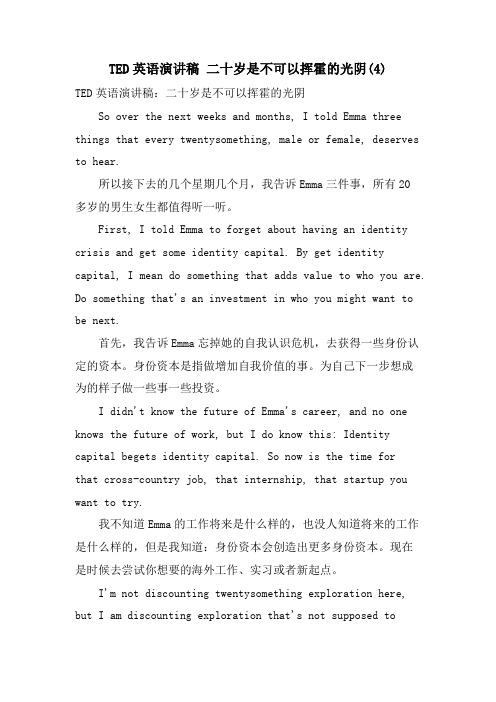
TED英语演讲稿二十岁是不可以挥霍的光阴(4)TED英语演讲稿:二十岁是不可以挥霍的光阴So over the next weeks and months, I told Emma three things that every twentysomething, male or female, deserves to hear.所以接下去的几个星期几个月,我告诉Emma三件事,所有20多岁的男生女生都值得听一听。
First, I told Emma to forget about having an identity crisis and get some identity capital. By get identity capital, I mean do something that adds value to who you are. Do something that's an investment in who you might want to be next.首先,我告诉Emma忘掉她的自我认识危机,去获得一些身份认定的资本。
身份资本是指做增加自我价值的事。
为自己下一步想成为的样子做一些事一些投资。
I didn't know the future of Emma's career, and no one knows the future of work, but I do know this: Identity capital begets identity capital. So now is the time forthat cross-country job, that internship, that startup you want to try.我不知道Emma的工作将来是什么样的,也没人知道将来的工作是什么样的,但是我知道:身份资本会创造出更多身份资本。
最新-TED英语演讲稿二十岁是不可以挥霍的光阴 精品
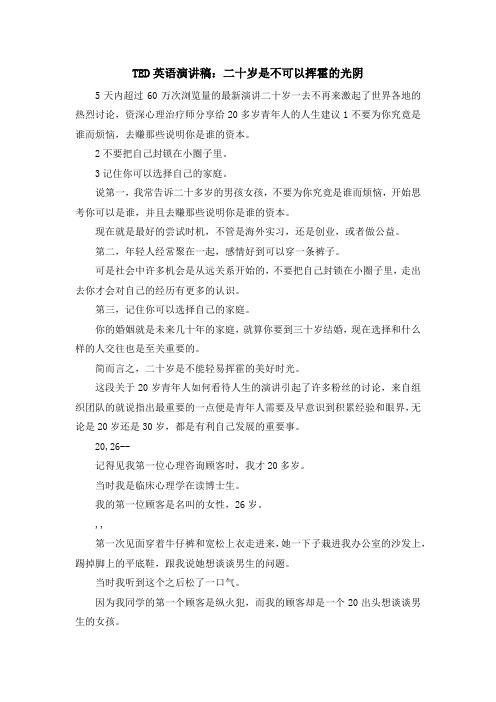
TED英语演讲稿:二十岁是不可以挥霍的光阴5天内超过60万次浏览量的最新演讲二十岁一去不再来激起了世界各地的热烈讨论,资深心理治疗师分享给20多岁青年人的人生建议1不要为你究竟是谁而烦恼,去赚那些说明你是谁的资本。
2不要把自己封锁在小圈子里。
3记住你可以选择自己的家庭。
说第一,我常告诉二十多岁的男孩女孩,不要为你究竟是谁而烦恼,开始思考你可以是谁,并且去赚那些说明你是谁的资本。
现在就是最好的尝试时机,不管是海外实习,还是创业,或者做公益。
第二,年轻人经常聚在一起,感情好到可以穿一条裤子。
可是社会中许多机会是从远关系开始的,不要把自己封锁在小圈子里,走出去你才会对自己的经历有更多的认识。
第三,记住你可以选择自己的家庭。
你的婚姻就是未来几十年的家庭,就算你要到三十岁结婚,现在选择和什么样的人交往也是至关重要的。
简而言之,二十岁是不能轻易挥霍的美好时光。
这段关于20岁青年人如何看待人生的演讲引起了许多粉丝的讨论,来自组织团队的就说指出最重要的一点便是青年人需要及早意识到积累经验和眼界,无论是20岁还是30岁,都是有利自己发展的重要事。
20,26--记得见我第一位心理咨询顾客时,我才20多岁。
当时我是临床心理学在读博士生。
我的第一位顾客是名叫的女性,26岁。
,,第一次见面穿着牛仔裤和宽松上衣走进来,她一下子栽进我办公室的沙发上,踢掉脚上的平底鞋,跟我说她想谈谈男生的问题。
当时我听到这个之后松了一口气。
因为我同学的第一个顾客是纵火犯,而我的顾客却是一个20出头想谈谈男生的女孩。
我觉得我可以搞定。
,但是我没有搞定。
不断地讲有趣的事情,而我只能简单地点头认同她所说的,很自然地就陷入了附和的状态。
"20,",,,,,说30岁是一个新的20岁。
没错,我告诉她你是对的。
工作还早,结婚还早,生孩子还早,甚至死亡也早着呢。
像和我这样20多岁的人,什么都没有但时间多的是。
,,",,,",",,"但不久之后,我的导师就要我向的感情生活施压。
不容错过的TED英语演讲稿:二十岁是不可以挥霍的光阴
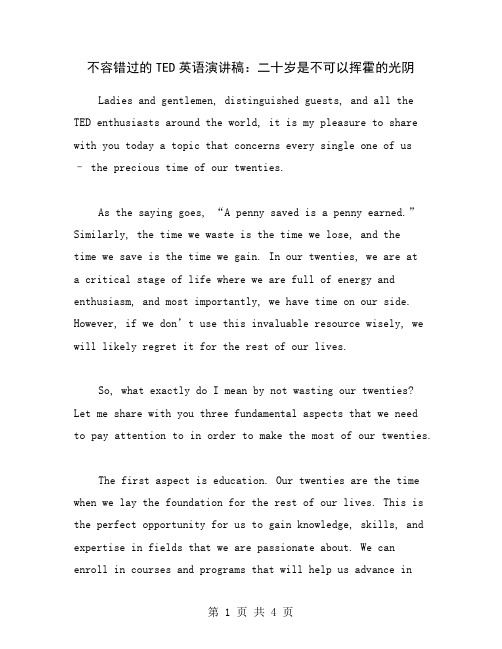
不容错过的TED英语演讲稿:二十岁是不可以挥霍的光阴Ladies and gentlemen, distinguished guests, and all the TED enthusiasts around the world, it is my pleasure to share with you today a topic that concerns every single one of us– the precious time of our twenties.As the saying goes, “A penny saved is a penny earned.” Similarly, the time we waste is the time we lose, and thetime we save is the time we gain. In our twenties, we are ata critical stage of life where we are full of energy and enthusiasm, and most importantly, we have time on our side. However, if we don’t use this invaluable resource wisely, we will likely regret it for the rest of our lives.So, what exactly do I mean by not wasting our twenties?Let me share with you three fundamental aspects that we needto pay attention to in order to make the most of our twenties.The first aspect is education. Our twenties are the time when we lay the foundation for the rest of our lives. This is the perfect opportunity for us to gain knowledge, skills, and expertise in fields that we are passionate about. We canenroll in courses and programs that will help us advance inour careers or pursue further studies in areas that we are interested in. We can also learn from mentors and experts in our industries, attend workshops and conferences, and read extensively on subjects that we are curious about.The second aspect is personal development. Our twenties are also the time when we begin to establish our identity, values, and purpose in life. This is the time when we can explore our interests, passions, and talents, and develop our strengths and weaknesses. We can travel to new places, meet new people, and experience different cultures. We can volunteer for causes that we care about, engage in sports and hobbies that we enjoy, and challenge ourselves to try new things.The third aspect is relationships. Our twenties are the time when we form lasting connections with the people whowill share our lives. This is the time when we can build relationships with family, friends, colleagues, and mentors who will support us through the ups and downs of life. We can also seek out romantic relationships that are healthy and fulfilling, and learn how to navigate the complexities of love, intimacy, and commitment.But why is it so important that we do all these things in our twenties? Let me give you three reasons.Firstly, our twenties are the time when our brains arestill malleable and adaptable. This means that we are able to learn new skills and knowledge more easily and quickly thanat any other time in our lives. We are also more open-minded and flexible, which makes it easier for us to adapt to new situations and experiences.Secondly, our twenties are the time when we have the most energy and vitality. This means that we are able to work hard, play hard, and achieve more than we ever will again in our lives. We are also more resilient and able to recover from setbacks and failures, which gives us the confidence to take risks and try new things.Lastly, our twenties are the time when we have the most freedom and independence. This means that we are able to make decisions and take actions that will shape our lives foryears to come. We are also less burdened by responsibilities and obligations, which gives us the space and time to focuson ourselves and our own growth.In conclusion, our twenties are a precious and valuable resource that we cannot afford to waste. We need to use this time wisely by investing in education, personal development, and relationships. By doing so, we will create a strong foundation for our future and live a life that is fulfilling, meaningful, and joyful. Remember, as the great philosopher Seneca said, “It is not that we have a short time to live, but that we waste a lot of it.” Let us not waste our twenties, but instead make the most of this incredible opportunity. Thank you.。
二十几岁不可挥霍的光阴演讲稿
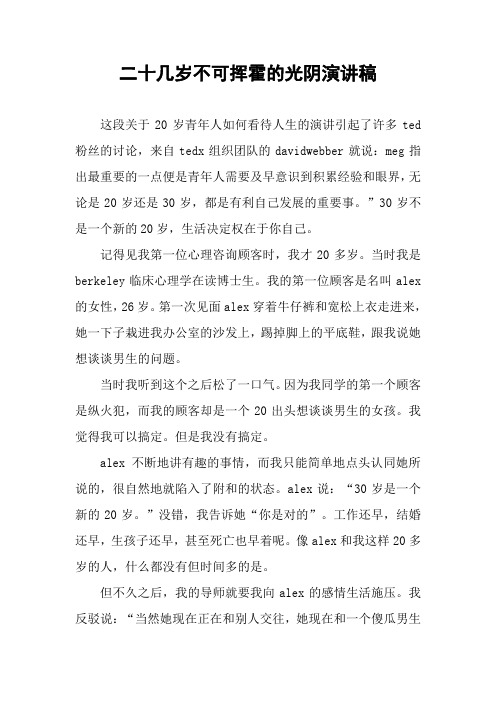
二十几岁不可挥霍的光阴演讲稿这段关于20岁青年人如何看待人生的演讲引起了许多ted 粉丝的讨论,来自tedx组织团队的davidwebber就说:meg指出最重要的一点便是青年人需要及早意识到积累经验和眼界,无论是20岁还是30岁,都是有利自己发展的重要事。
”30岁不是一个新的20岁,生活决定权在于你自己。
记得见我第一位心理咨询顾客时,我才20多岁。
当时我是berkeley临床心理学在读博士生。
我的第一位顾客是名叫alex 的女性,26岁。
第一次见面alex穿着牛仔裤和宽松上衣走进来,她一下子栽进我办公室的沙发上,踢掉脚上的平底鞋,跟我说她想谈谈男生的问题。
当时我听到这个之后松了一口气。
因为我同学的第一个顾客是纵火犯,而我的顾客却是一个20出头想谈谈男生的女孩。
我觉得我可以搞定。
但是我没有搞定。
alex不断地讲有趣的事情,而我只能简单地点头认同她所说的,很自然地就陷入了附和的状态。
alex说:“30岁是一个新的20岁。
”没错,我告诉她“你是对的”。
工作还早,结婚还早,生孩子还早,甚至死亡也早着呢。
像alex和我这样20多岁的人,什么都没有但时间多的是。
但不久之后,我的导师就要我向alex的感情生活施压。
我反驳说:“当然她现在正在和别人交往,她现在和一个傻瓜男生睡觉,但看样子她不会和他结婚的。
”而我的导师说:“不着急,她也许会和下一个结婚。
但修复alex婚姻的最好时期,是她还没拥有婚姻的时期。
”这就是心理学家说的“顿悟时刻”。
正是那个时候我意识到,30岁不是一个新的20岁。
的确,和以前的人相比,现在人们更晚才安定下来,但是这不代表alex就能长期处于20多岁的状态。
更晚安定下来,应该使alex的20多岁成为发展的黄金时段,而我们却坐在那里忽视这个发展的时机。
从那时起我意识到,这种善意的忽视,确实是个问题,它不仅给alex本身和她的感情生活带来不良后果,而且影响到处20多岁的人的事业、家庭和未来。
现在在美国,20多岁的人有五千万,也就是15%的人口,或者可以说所有人口,因为所有成年人都要经历他们的20多岁。
Ted演讲:二十几岁是不可挥霍的光阴全文

Ted演讲:二十几岁是不可挥霍的光阴全文20岁,不可挥霍的光阴。
在这个点击过百万的TED演讲中,心理咨询师Meg Jay说不能因为婚姻、工作和子女是以后的事情,现在就可以无规划的生活。
她提供三条建议帮助20多岁的年轻人重新审视自己的生活,不要做后悔的决定。
为什么要听她演讲近期观点认为,25岁似乎太过年轻,无法做重大决定。
临床心理学家Meg Jay藉由心理学实务和著作《20世代,你的人生是不是卡住了》阐述,许多二十世代深陷《时代》杂志所谓「我我我世代」的迷思和误导中。
她认为「三十世代是新二十世代」的说法使人们轻忽成年阶段最具可塑性的时光。
撷取十余年来与数百名二十世代个案及学生咨商的经验,Jay将科学融入一段段引人入胜、不为人知的故事中。
精彩、生动的故事发展,显示为何二十世代并非发展停滞期,而是仅此一次的发展高峰。
二十世代是个关键期,我们所做之事-及未做之事-对未来人生、甚至后代都将产生巨大影响。
Meg Jay:二十几岁,不可挥霍的光阴When I was in my 20s, I saw my very first psychotherapy client. I was a Ph.D. student in clinical psychology at Berkeley. She was a 26-year-old woman named Alex. Now Alex walked into her first session wearing jeans and a big slouchy top, and she dropped onto the couch in my office and kicked off her flats and told me she was there to talk about guy problems. Now when I heard this, I was so relieved. My classmate got an arsonist for her first client. (Laughter) And I got a twentysomething who wanted to talk about boys. This I thought I could handle.But I didn't handle it. With the funny stories that Alex would bring to session, it was easy for me just to nod my head while we kicked the can down the road. "Thirty's the new 20," Alex wouldsay, and as far as I could tell, she was right. Work happened later, marriage happened later, kids happened later, even death happened later. Twentysomethings like Alex and I had nothing but time.But before long, my supervisor pushed me to push Alex about her love life. I pushed back.I said, "Sure, she's dating down, she's sleeping with a knucklehead, but it's not like she's going to marry the guy."And then my supervisor said, "Not yet, but she might marry the next one. Besides, the best time to work on Alex's marriage is before she has one."That's what psychologists call an "Aha!" moment. That was the moment I realized, 30 is not the new 20. Yes, people settle down later than they used to, but that didn't make Alex's 20s a developmental downtime. That made Alex's 20s a developmental sweet spot, and we were sitting there blowing it. That was when I realized that this sort of benign neglect was a real problem, and it had real consequences, not just for Alex and her love life but for the careers and the families and the futures of twentysomethings everywhere.There are 50 million twentysomethings in the United States right now. We're talking about 15 percent of the population, or 100 percent if you consider that no one's getting through adulthood without going through their 20s first.Raise your hand if you're in your 20s. I really want to see some twentysomethings here. Oh, yay! Y'all's awesome. If you work with twentysomethings, you love a twentysomething, you're losing sleep over twentysomethings, I want to see — Okay. Awesome, twentysomethings really matter.So I specialize in twentysomethings because I believe thatevery single one of those 50 million twentysomethings deserves to know what psychologists, sociologists, neurologists and fertility specialists already know: that claiming your 20s is one of the simplest, yet most transformative, things you can do for work, for love, for your happiness, maybe even for the world.This is not my opinion. These are the facts. We know that 80 percent of life's most defining moments take place by age 35. That means that eight out of 10 of the decisions and experiences and "Aha!" moments that make your life what it is will have happened by your mid-30s. People who are over 40, don't panic. This crowd is going to be fine, I think. We know that the first 10 years of a career has an exponential impact on how much money you're going to earn. We know that more than half of Americans are married or are living with or dating their future partner by 30. We know that the brain caps off its second and last growth spurt in your 20s as it rewires itself for adulthood, which means that whatever it is you want to change about yourself, now is the time to change it. We know that personality changes more during your 20s than at any other time in life, and we know that female fertility peaks at age 28, and things get tricky after age 35. So your 20s are the time to educate yourself about your body and your options.So when we think about child development, we all know that the first five years are a critical period for language and attachment in the brain. It's a time when your ordinary, day-to-day life has an inordinate impact on who you will become. But what we hear less about is that there's such a thing as adult development, and our 20s are that critical period of adult development.But this isn't what twentysomethings are hearing.Newspapers talk about the changing timetable of adulthood. Researchers call the 20s an extended adolescence. Journalists coin silly nicknames for twentysomethings like "twixters" and "kidults." It's true. As a culture, we have trivialized what is actually the defining decade of adulthood.Leonard Bernstein said that to achieve great things, you need a plan and not quite enough time. Isn't that true? So what do you think happens when you pat a twentysomething on the head and you say, "You have 10 extra years to start your life"? Nothing happens. You have robbed that person of his urgency and ambition, and absolutely nothing happens.And then every day, smart, interesting twentysomethings like you or like your sons and daughters come into my office and say things like this: "I know my boyfriend's no good for me, but this relationship doesn't count. I'm just killing time." Or they say, "Everybody says as long as I get started on a career by the time I'm 30, I'll be fine."But then it starts to sound like this: "My 20s are almost over, and I have nothing to show for myself. I had a better résumé the day after I graduated from college."And then it starts to sound like this: "Dating in my 20s was like musical chairs. Everybody was running around and having fun, but then sometime around 30 it was like the music turned off and everybody started sitting down. I didn't want to be the only one left standing up, so sometimes I think I married my husband because he was the closest chair to me at 30."Where are the twentysomethings here? Do not do that.Okay, now that sounds a little flip, but make no mistake, the stakes are very high. When a lot has been pushed to your 30s, there is enormous thirtysomething pressure to jump-start acareer, pick a city, partner up, and have two or three kids in a much shorter period of time. Many of these things are incompatible, and as research is just starting to show, simply harder and more stressful to do all at once in our 30s.The post-millennial midlife crisis isn't buying a red sports car. It's realizing you can't have that career you now want. It's realizing you can't have that child you now want, or you can't give your child a sibling. Too many thirtysomethings and fortysomethings look at themselves, and at me, sitting across the room, and say about their 20s, "What was I doing? What was I thinking?"I want to change what twentysomethings are doing and thinking.Here's a story about how that can go. It's a story about a woman named Emma. At 25, Emma came to my office because she was, in her words, having an identity crisis. She said she thought she might like to work in art or entertainment, but she hadn't decided yet, so she'd spent the last few years waiting tables instead. Because it was cheaper, she lived with a boyfriend who displayed his temper more than his ambition. And as hard as her 20s were, her early life had been even harder. She often cried in our sessions, but then would collect herself by saying, "You can't pick your family, but you can pick your friends."Well one day, Emma comes in and she hangs her head in her lap, and she sobbed for most of the hour. She'd just bought a new address book, and she'd spent the morning filling in her many contacts, but then she'd been left staring at that empty blank that comes after the words "In case of emergency, please call ... ." She was nearly hysterical when she looked at me and said, "Who's going to be there for me if I get in a car wreck? Who's going to take care of me if I have cancer?"Now in that moment, it took everything I had not to say, "I will." But what Emma needed wasn't some therapist who really, really cared. Emma needed a better life, and I knew this was her chance. I had learned too much since I first worked with Alex to just sit there while Emma's defining decade went parading by.So over the next weeks and months, I told Emma three things that every twentysomething, male or female, deserves to hear.First, I told Emma to forget about having an identity crisis and get some identity capital. By get identity capital, I mean do something that adds value to who you are. Do something that's an investment in who you might want to be next. I didn't know the future of Emma's career, and no one knows the future of work, but I do know this: Identity capital begets identity capital. So now is the time for that cross-country job, that internship, that startup you want to try. I'm not discounting twentysomething exploration here, but I am discounting exploration that's not supposed to count, which, by the way, is not exploration. That's procrastination. I told Emma to explore work and make it count.Second, I told Emma that the urban tribe is overrated. Best friends are great for giving rides to the airport, but twentysomethings who huddle together with like-minded peers limit who they know, what they know, how they think, how they speak, and where they work. That new piece of capital, that new person to date almost always comes from outside the inner circle. New things come from what are called our weak ties, our friends of friends of friends. So yes, half of twentysomethings are un- or under-employed. But half aren't, and weak ties are how you get yourself into that group. Half of new jobs are never posted, so reaching out to your neighbor's boss is how you get that un-posted job. It's not cheating. It's the science of how informationspreads.Last but not least, Emma believed that you can't pick your family, but you can pick your friends. Now this was true for her growing up, but as a twentysomething, soon Emma would pick her family when she partnered with someone and created a family of her own. I told Emma the time to start picking your family is now. Now you may be thinking that 30 is actually a better time to settle down than 20, or even 25, and I agree with you. But grabbing whoever you're living with or sleeping with when everyone on Facebook starts walking down the aisle is not progress. The best time to work on your marriage is before you have one, and that means being as intentional with love as you are with work. Picking your family is about consciously choosing who and what you want rather than just making it work or killing time with whoever happens to be choosing you.So what happened to Emma? Well, we went through that address book, and she found an old roommate's cousin who worked at an art museum in another state. That weak tie helped her get a job there. That job offer gave her the reason to leave that live-in boyfriend. Now, five years later, she's a special events planner for museums. She's married to a man she mindfully chose. She loves her new career, she loves her new family, and she sent me a card that said, "Now the emergency contact blanks don't seem big enough."Now Emma's story made that sound easy, but that's what I love about working with twentysomethings. They are so easy to help. Twentysomethings are like airplanes just leaving LAX, bound for somewhere west. Right after takeoff, a slight change in course is the difference between landing in Alaska or Fiji. Likewise, at 21 or 25 or even 29, one good conversation, onegood break, one good TED Talk, can have an enormous effect across years and even generations to come.So here's an idea worth spreading to every twentysomething you know. It's as simple as what I learned to say to Alex. It's what I now have the privilege of saying to twentysomethings like Emma every single day: Thirty is not the new 20, so claim your adulthood, get some identity capital, use your weak ties, pick your family. Don't be defined by what you didn't know or didn't do. You're deciding your life right now. Thank you. (Applause)。
TED英语演讲稿:二十岁是不可以挥霍的光阴
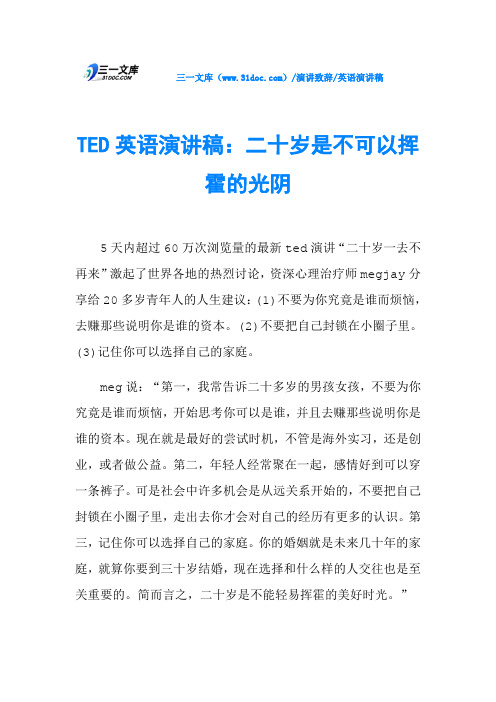
三一文库()/演讲致辞/英语演讲稿TED英语演讲稿:二十岁是不可以挥霍的光阴5天内超过60万次浏览量的最新ted演讲“二十岁一去不再来”激起了世界各地的热烈讨论,资深心理治疗师megjay分享给20多岁青年人的人生建议:(1)不要为你究竟是谁而烦恼,去赚那些说明你是谁的资本。
(2)不要把自己封锁在小圈子里。
(3)记住你可以选择自己的家庭。
meg说:“第一,我常告诉二十多岁的男孩女孩,不要为你究竟是谁而烦恼,开始思考你可以是谁,并且去赚那些说明你是谁的资本。
现在就是最好的尝试时机,不管是海外实习,还是创业,或者做公益。
第二,年轻人经常聚在一起,感情好到可以穿一条裤子。
可是社会中许多机会是从远关系开始的,不要把自己封锁在小圈子里,走出去你才会对自己的经历有更多的认识。
第三,记住你可以选择自己的家庭。
你的婚姻就是未来几十年的家庭,就算你要到三十岁结婚,现在选择和什么样的人交往也是至关重要的。
简而言之,二十岁是不能轻易挥霍的美好时光。
”这段关于20岁青年人如何看待人生的演讲引起了许多ted 粉丝的讨论,来自tedx组织团队的davidwebber就说:meg 指出最重要的一点便是青年人需要及早意识到积累经验和眼界,无论是20岁还是30岁,都是有利自己发展的重要事。
”wheniwasinmy20s,isawmyveryfirstpsychotherapycl ient.iwasaph.d.studentinclinicalpsychologyatbe rkeley.shewasa26-year-oldwomannamedalex.记得见我第一位心理咨询顾客时,我才20多岁。
当时我是berkeley临床心理学在读博士生。
我的第一位顾客是名叫alex的女性,26岁。
nowalexwalkedintoherfirstsessionwearingjeansan dabigslouchytop,andshedroppedontothecouchinmyo fficeandkickedoffherflatsandtoldmeshewastheret otalkaboutguyproblems.nowwheniheardthis,iwasso relieved.myclassmategotanarsonistforherfirstcl ient.(laughter)andigotatwentysomethingwhowante dtotalkaboutboys.thisithoughticouldhandle.第一次见面alex穿着牛仔裤和宽松上衣走进来,她一下子栽进我办公室的沙发上,踢掉脚上的平底鞋,跟我说她想谈谈男生的问题。
TED英语演讲稿:二十几岁不可挥霍的光阴(附翻译)演讲稿.doc
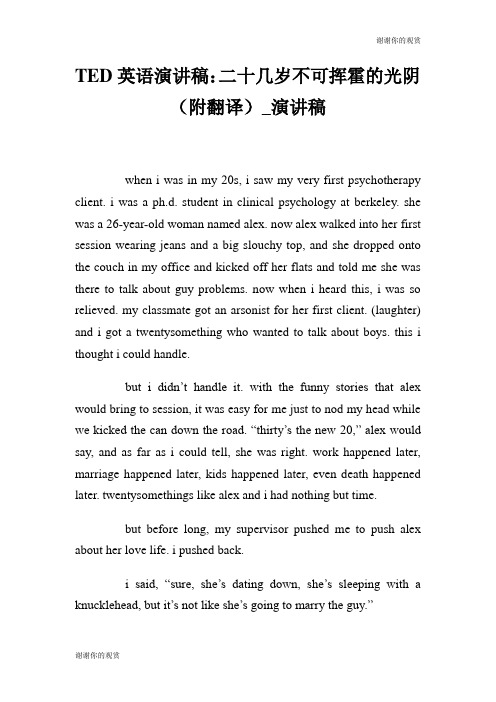
TED英语演讲稿:二十几岁不可挥霍的光阴(附翻译)_演讲稿when i was in my 20s, i saw my very first psychotherapy client. i was a ph.d. student in clinical psychology at berkeley. she was a 26-year-old woman named alex. now alex walked into her first session wearing jeans and a big slouchy top, and she dropped onto the couch in my office and kicked off her flats and told me she was there to talk about guy problems. now when i heard this, i was so relieved. my classmate got an arsonist for her first client. (laughter) and i got a twentysomething who wanted to talk about boys. this i thought i could handle.but i didn’t handle it. with the funny stories that alex would bring to session, it was easy for me just to nod my head while we kicked the can down the road. “thirty’s the new20,” alex would say, and as far as i could tell, she was right. work happened later, marriage happened later, kids happened later, even death happened later. twentysomethings like alex and i had nothing but time.but before long, my supervisor pushed me to push alex about her love life. i pushed back.i said, “sure, she’s dating down, she’s sleeping with a knucklehead, but it’s not like she’s going to marry the guy.”and then my supervisor said, “not yet, but she might marry the next one. besides, the best time to work on alex’s marriage is before she has one.”that’s what psychologists call an “aha!” moment. that was the moment i realized, 30 is not the new 20. yes, people settle down later than they used to, but that didn’t make alex’s 20s a d evelopmental downtime. that made alex’s 20s a developmental sweet spot, and we were sitting there blowing it. that was when i realized that this sort of benign neglect was a real problem, and it had real consequences, not just for alex and her love life but for the careers and the families and the futures of twentysomethings everywhere.there are 50 million twentysomethings in the united states right now. we’re talking about 15 percent of the population, or 100 percent if you consider that no one’s getti ng through adulthood without going through their 20s first.raise your hand if you’re in your 20s. i really want to see some twentysomethings here. oh, yay! y’all’s awesome. if you work with twentysomethings, you love a twentysomething, you’re losing sleep over twentysomethings, i want to see —okay. awesome, twentysomethings really matter.so i specialize in twentysomethings because i believe that every single one of those 50 million twentysomethings deserves to know what psychologists, sociologists, neurologists and fertilityspecialists already know: that claiming your 20s is one of the simplest, yet most transformative, things you can do for work, for love, for your happiness, maybe even for the world.this is not my opinion. these are the facts. we know that 80 percent of life’s most defining moments take place by age 35. that means that eight out of 10 of the decisions and experiences and “aha!” moments that make your life what it is will have happened by your mid-30s. people who are over 40, d on’t panic. this crowd is going to be fine, i think. we know that the first 10 years of a career has an exponential impact on how much money you’re going to earn. we know that more than half of americans are married or are living with or dating their future partner by 30. we know that the brain caps off its second and last growth spurt in your 20s as it rewires itself for adulthood, which means that whatever it is you want to change about yourself, now is the time to change it. we know that personality changes more during your 20s than at any other time in life, and we know that female fertility peaks at age 28, and things get tricky after age 35. so your 20s are the time to educate yourself about your body and your options.so when we think about child development, we all know that the first five years are a critical period for language and attachment in the brain. it’s a time when your ordinary, day-to-day life has an inordinate impact on who you will become. but what we hear less about is that there’s s uch a thing as adult development, and our 20s are that critical period of adult development.but this isn’t what twentysomethings are hearing. newspapers talk about the changing timetable of adulthood. researchers call the 20s an extended adolescence. journalists coin silly nicknames for twentysomethings like “twixters” and “kidults.” it’s true. as a culture, we have trivialized what is actually the defining decade of adulthood.leonard bernstein said that to achieve great things, you need a plan and not quite enough time. isn’t that true? so what do you think happens when you pat a twentysomething on the head and you say, “you have 10 extra years to start your life”? nothing happens. you have robbed that person of his urgency and ambition, and absolutely nothing happens.and then every day, smart, interesting twentysomethings like you or like your sons and daughters come into my office and say things like this: “i know my boyfriend’s no good for me, but this relationship doesn’t count. i’m just killing time.” or they say, “everybody says as long as i get started on a career by the time i’m 30, i’ll be fine.”but then it starts to sound like this: “my 20s are almost over, and i have nothing to show for myself. i had a better résuméthe day after i graduated from college.”and then it starts to sound like this: “dating in my 20s was like musical chairs. everybody was running around and having fun, but then sometime around 30 it was like the music turned off andeverybody started sitting down. i di dn’t want to be the only one left standing up, so sometimes i think i married my husband because he was the closest chair to me at 30.”where are the twentysomethings here? do not do that.okay, now that sounds a little flip, but make no mistake, the stakes are very high. when a lot has been pushed to your 30s, there is enormous thirtysomething pressure to jump-start a career, pick a city, partner up, and have two or three kids in a much shorter period of time. many of these things are incompatible, and as research is just starting to show, simply harder and more stressful to do all at once in our 30s.the post-millennial midlife crisis isn’t buying a red sports car. it’s realizing you can’t have that career you now want. it’s realizing you can’t have that child you now want, or you can’t give your child a sibling. too many thirtysomethings and fortysomethings look at themselves, and at me, sitting across the room, and say about their 20s, “what was i doing? what was i thinking?”i want to change what twentysomethings are doing and thinking.here’s a story about how that can go. it’s a story about a woman named emma. at 25, emma came to my office because she was, in her words, having an identity crisis. she said she thought she might like to wor k in art or entertainment, but she hadn’t decided yet, so she’d spent the last few years waiting tables instead. because itwas cheaper, she lived with a boyfriend who displayed his temper more than his ambition. and as hard as her 20s were, her early life had been even harder. she often cried in our sessions, but then would collect herself by saying, “you can’t pick your family, but you can pick your friends.”well one day, emma comes in and she hangs her head in her lap, and she sobbed for most of the hour. she’d just bought a new address book, and she’d spent the morning filling in her many contacts, but then she’d been left staring at that empty blank that comes after the words “in case of emergency, please call ... .” she was nearly hysterical when s he looked at me and said, “who’s going to be there for me if i get in a car wreck? who’s going to take care of me if i have cancer?”now in that moment, it took everything i had not to say, “i will.” but what emma needed wasn’t some therapist who really, really cared. emma needed a better life, and i knew this was her chance. i had learned too much since i first worked with alex to just sit there while emma’s defining decade went parading by.so over the next weeks and months, i told emma three things that every twentysomething, male or female, deserves to hear.first, i told emma to forget about having an identity crisis and get some identity capital. by get identity capital, i mean do something that adds value to who you are. do something that’s a n investment in who you might want to be next. i didn’t know thefuture of emma’s career, and no one knows the future of work, but i do know this: identity capital begets identity capital. so now is the time for that cross-country job, that internship, that startup you want to try. i’m not discounting twentysomething exploration here, but i am discounting exploration that’s not supposed to count, which, by the way, is not exploration. that’s procrastination. i told emma to explore work and make it count.second, i told emma that the urban tribe is overrated. best friends are great for giving rides to the airport, but twentysomethings who huddle together with like-minded peers limit who they know, what they know, how they think, how they speak, and where they work. that new piece of capital, that new person to date almost always comes from outside the inner circle. new things come from what are called our weak ties, our friends of friends of friends. so yes, half of twentysomethings are un- or under-employe d. but half aren’t, and weak ties are how you get yourself into that group. half of new jobs are never posted, so reaching out to your neighbor’s boss is how you get that un-posted job. it’s not cheating. it’s the science of how information spreads.las t but not least, emma believed that you can’t pick your family, but you can pick your friends. now this was true for her growing up, but as a twentysomething, soon emma would pick her family when she partnered with someone and created a family of her own. i told emma the time to start picking your family is now. now you may be thinking that 30 is actually a better time to settle downthan 20, or even 25, and i agree with you. but grabbing whoever you’re living with or sleeping with when everyone on facebook starts walking down the aisle is not progress. the best time to work on your marriage is before you have one, and that means being as intentional with love as you are with work. picking your family is about consciously choosing who and what you want rather than just making it work or killing time with whoever happens to be choosing you.so what happened to emma? well, we went through that address book, and she found an old roommate’s cousin who worked at an art museum in another state. that weak tie helped her get a job there. that job offer gave her the reason to leave that live-in boyfriend. now, five years later, she’s a special events planner for museums. she’s married to a man she mindfully chose. she loves her new career, she loves her new family, and she sent me a card that said, “now the emergency contact blanks don’t seem big enough.”now emma’s story made that sound easy, but that’s what i love about working with twentysomethings. they are so easy to help. twentysomethings are like airplanes just leaving lax, bound for somewhere west. right after takeoff, a slight change in course is the difference between landing in alaska or fiji. likewise, at 21 or 25 or even 29, one good conversation, one good break, one good ted talk, can have an enormous effect across years and even generations to come.so here’s an idea worth spreading to everytwentysomething you know. it’s as simple as what i learned to say to alex. it’s what i now have the privilege of saying to twentysomethings like emma every single day: thirty is not the new 20, so claim your adulthood, get some identity capital, use your weak ties, pick your family. don’t be defined by what you didn’t know or didn’t do. you’re deciding your life right now. thank you. (applause)译文:记得见我第一位心理咨询顾客时,我才20多岁。
2021年TED英语演讲稿 二十岁是不可以挥霍的光阴(4)

TED英语演讲稿二十岁是不可以挥霍的光阴(4) TED英语演讲稿: ___岁是不可以挥霍的光阴So over the next weeks and months, I told Em ___ three things that every twentysomething, ___le or fe ___le, deserves to hear.所以接下去的几个星期几个月,我告诉Em ___三件事,所有20多岁的男生女生都值得听一听。
First, I told Em ___ to forget about having an identity crisis and get some identity capital. By get identity capital, I mean do something that adds value to who you are. Do something that's an investment in who you might want to be next.首先,我告诉Em ___忘掉她的自我认识危机,去获得一些身份认定的资本。
身份资本是指做增加自我价值的事。
为自己下一步想成为的样子做一些事一些投资。
I didn't know the future of Em ___'s career, and no one knows the future of work, but I do know this: Identitycapital begets identity capital. So now is the time forthat cross-country job, that internship, that startup you want to try.我不知道Em ___的工作将来是什么样的,也没人知道将来的工作是什么样的,但是我知道:身份资本会创造出更多身份资本。
2021年TED英语演讲稿 二十岁是不可以挥霍的光阴(3)

TED英语演讲稿二十岁是不可以挥霍的光阴(3) TED英语演讲稿: ___岁是不可以挥霍的光阴But then it starts to sound like this: "My 20s are almost over, and I have nothing to show for myself. I had a better résumé the day after I graduated from college." And then it starts to sound like this: "Dating in my 20s was like musical chairs. Everybody was running around and having fun, but then sometime around 30 it was like the music turned off and everybody started sitting down.但是实际听上去却是:“我马上就要三十了,却根本就没有东西展示。
我只是在大学毕业时有过一份最漂亮的。
”或是这样:“我20多岁时的约会就像找凳子。
每个人都绕着凳子跑,随便玩一玩,但是快30的时候就像音乐停止了,所有人开始坐下。
I didn't want to be the only one left standing up, so sometimes I think I ___rried my hu ___and because he was the closest chair to me at 30." Where are the twentysomethings here? Do not do that. Okay, now that sounds a little flip, but ___ke no mistake, the stakes are very high.我不想成为那唯一站着的人,所以有时候我会想我和我丈夫之所以会结婚,是因为在我30岁的时候,他是当时离我最近的那张凳子。
Meg Jay 20岁,不可挥霍的光阴

For personal use only in study and research; not for commercial useMeg Jay 20岁,不可挥霍的光阴临床心理学家Meg Jay表示:二十几岁对于一个人异常重要,在这段时期内人的性格和世界观趋于完整,而如果你在 30 岁之前,还没有树立自己完整而独立的世界观,你就注定会失败。
在这个点击过百万的TED演讲中,Meg Jay分享给20多岁青年人的人生建议:“第一,我常告诉二十多岁的男孩女孩,不要为你究竟是谁而烦恼,开始思考你可以是谁,并且去赚那些说明你是谁的资本。
现在就是最好的尝试时机,不管是海外实习,还是创业,或者做公益。
第二,年轻人经常聚在一起,感情好到可以穿一条裤子。
可是社会中许多机会是从远关系开始的,不要把自己封锁在小圈子里,走出去你才会对自己的经历有更多的认识。
第三,记住你可以选择自己的家庭。
你的婚姻就是未来几十年的家庭,就算你要到三十岁结婚,现在选择和什么样的人交往也是至关重要的。
简而言之,二十岁是不能轻易挥霍的美好时光。
”When I was in my 20s, I saw my very first psychotherapy client. I was a Ph.D. student in clinical psychology at Berkeley. She was a 26-year-old woman named Alex.记得见我第一位心理咨询顾客时,我才20多岁。
当时我是Berkeley临床心理学在读博士生。
我的第一位顾客是名叫Alex的女性,26岁。
Now Alex walked into her first session wearing jeans and a big slouchy top, and she dropped onto the couch in my office and kicked off her flats and told me she was there to talk about guy problems. Now when I heard this, I was so relieved. My classmate got an arsonist for her first client. (Laughter) And I got a twentysomething who wanted to talk about boys. This I thought I could handle.第一次见面Alex穿着牛仔裤和宽松上衣走进来,她一下子栽进我办公室的沙发上,踢掉脚上的平底鞋,跟我说她想谈谈男生的问题。
TED演讲:20岁,不可挥霍的光阴双语
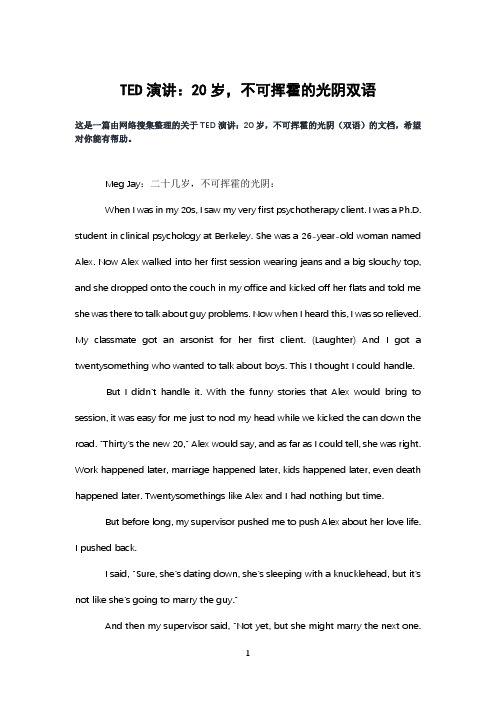
TED演讲:20岁,不可挥霍的光阴双语这是一篇由网络搜集整理的关于TED演讲:20岁,不可挥霍的光阴(双语)的文档,希望对你能有帮助。
Meg Jay:二十几岁,不可挥霍的光阴:When I was in my 20s, I saw my very first psychotherapy client. I was a Ph.D. student in clinical psychology at Berkeley. She was a 26-year-old woman named Alex. Now Alex walked into her first session wearing jeans and a big slouchy top, and she dropped onto the couch in my office and kicked off her flats and told me she was there to talk about guy problems. Now when I heard this, I was so relieved. My classmate got an arsonist for her first client. (Laughter) And I got a twentysomething who wanted to talk about boys. This I thought I could handle.But I didn't handle it. With the funny stories that Alex would bring to session, it was easy for me just to nod my head while we kicked the can down the road. "Thirty's the new 20," Alex would say, and as far as I could tell, she was right. Work happened later, marriage happened later, kids happened later, even death happened later. Twentysomethings like Alex and I had nothing but time.But before long, my supervisor pushed me to push Alex about her love life.I pushed back.I said, "Sure, she's dating down, she's sleeping with a knucklehead, but it's not like she's going to marry the guy."And then my supervisor said, "Not yet, but she might marry the next one.Besides, the best time to work on Alex's marriage is before she has one."That's what psychologists call an "Aha!" moment. That was the moment I realized, 30 is not the new 20. Yes, people settle down later than they used to, but that didn't make Alex's 20s a developmental downtime. That made Alex's 20s a developmental sweet spot, and we were sitting there blowing it. That was when I realized that this sort of benign neglect was a real problem, and it had real consequences, not just for Alex and her love life but for the careers and the families and the futures of twentysomethings everywhere.There are 50 million twentysomethings in the United States right now. We're talking about 15 percent of the population, or 100 percent if you consider that no one's getting through adulthood without going through their 20s first.Raise your hand if you're in your 20s. I really want to see some twentysomethings here. Oh, yay! Y'all's awesome. If you work with twentysomethings, you love a twentysomething, you're losing sleep over twentysomethings, I want to see —Okay. Awesome, twentysomethings really matter.So I specialize in twentysomethings because I believe that every single one of those 50 million twentysomethings deserves to know what psychologists, sociologists, neurologists and fertility specialists already know: that claiming your 20s is one of the simplest, yet most transformative, things you can do for work, for love, for your happiness, maybe even for the world.This is not my opinion. These are the facts. We know that 80 percent oflife's most defining moments take place by age 35. That means that eight out of 10 of the decisions and experiences and "Aha!" moments that make your life what it is will have happened by your mid-30s. People who are over 40, don't panic. This crowd is going to be fine, I think. We know that the first 10 years of a career has an exponential impact on how much money you're going to earn. We know that more than half of Americans are married or are living with or dating their future partner by 30. We know that the brain caps off its second and last growth spurt in your 20s as it rewires itself for adulthood, which means that whatever it is you want to change about yourself, now is the time to change it. We know that personality changes more during your 20s than at any other time in life, and we know that female fertility peaks at age 28, and things get tricky after age 35. So your 20s are the time to educate yourself about your body and your options.So when we think about child development, we all know that the first five years are a critical period for language and attachment in the brain. It's a time when your ordinary, day-to-day life has an inordinate impact on who you will become. But what we hear less about is that there's such a thing as adult development, and our 20s are that critical period of adult development.But this isn't what twentysomethings are hearing. Newspapers talk about the changing timetable of adulthood. Researchers call the 20s an extended adolescence. Journalists coin silly nicknames for twentysomethings like "twixters" and "kidults." It's true. As a culture, we have trivialized what is actually the defining decade of adulthood.Leonard Bernstein said that to achieve great things, you need a plan and not quite enough time. Isn't that true So what do you think happens when you pat a twentysomething on the head and you say, "You have 10 extra years to start your life" Nothing happens. You have robbed that person of his urgency and ambition, and absolutely nothing happens.And then every day, smart, interesting twentysomethings like you or like your sons and daughters come into my office and say things like this: "I know my boyfriend's no good for me, but this relationship doesn't count. I'm just killing time." Or they say, "Everybody says as long as I get started on a career by the time I'm 30, I'll be fine."But then it starts to sound like this: "My 20s are almost over, and I have nothing to show for myself. I had a better résumé the day after I graduated from college."And then it starts to sound like this: "Dating in my 20s was like musical chairs. Everybody was running around and having fun, but then sometime around 30 it was like the music turned off and everybody started sitting down. I didn't want to be the only one left standing up, so sometimes I think I married my husband because he was the closest chair to me at 30."Where are the twentysomethings hereDo not do that.Okay, now that sounds a little flip, but make no mistake, the stakes are very high. When a lot has been pushed to your 30s, there is enormous thirtysomethingpressure to jump-start a career, pick a city, partner up, and have two or three kids in a much shorter period of time. Many of these things are incompatible, and as research is just starting to show, simply harder and more stressful to do all at once in our 30s.The post-millennial midlife crisis isn't buying a red sports car. It's realizing you can't have that career you now want. It's realizing you can't have that child you now want, or you can't give your child a sibling. Too many thirtysomethings and fortysomethings look at themselves, and at me, sitting across the room, and say about their 20s, "What was I doing What was I thinking"I want to change what twentysomethings are doing and thinking.Here's a story about how that can go. It's a story about a woman named Emma. At 25, Emma came to my office because she was, in her words, having an identity crisis. She said she thought she might like to work in art or entertainment, but she hadn't decided yet, so she'd spent the last few years waiting tables instead. Because it was cheaper, she lived with a boyfriend who displayed his temper more than his ambition. And as hard as her 20s were, her early life had been even harder. She often cried in our sessions, but then would collect herself by saying, "You can't pick your family, but you can pick your friends."Well one day, Emma comes in and she hangs her head in her lap, and she sobbed for most of the hour. She'd just bought a new address book, and she'd spent the morning filling in her many contacts, but then she'd been left staring at that empty blank that comes after the words "In case of emergency, please call ... ."She was nearly hysterical when she looked at me and said, "Who's going to be there for me if I get in a car wreck Who's going to take care of me if I have cancer"Now in that moment, it took everything I had not to say, "I will." But what Emma needed wasn't some therapist who really, really cared. Emma needed a better life, and I knew this was her chance. I had learned too much since I first worked with Alex to just sit there while Emma's defining decade went parading by.So over the next weeks and months, I told Emma three things that every twentysomething, male or female, deserves to hear.First, I told Emma to forget about having an identity crisis and get some identity capital. By get identity capital, I mean do something that adds value to who you are. Do something that's an investment in who you might want to be next. I didn't know the future of Emma's career, and no one knows the future of work, but I do know this: Identity capital begets identity capital. So now is the time for that cross-country job, that internship, that startup you want to try. I'm not discounting twentysomething exploration here, but I am discounting exploration that's not supposed to count, which, by the way, is not exploration. That's procrastination. I told Emma to explore work and make it count.Second, I told Emma that the urban tribe is overrated. Best friends are great for giving rides to the airport, but twentysomethings who huddle together with like-minded peers limit who they know, what they know, how they think, how they speak, and where they work. That new piece of capital, that new person to datealmost always comes from outside the inner circle. New things come from what are called our weak ties, our friends of friends of friends. So yes, half of twentysomethings are un- or under-employed. But half aren't, and weak ties are how you get yourself into that group. Half of new jobs are never posted, so reaching out to your neighbor's boss is how you get that un-posted job. It's not cheating. It's the science of how information spreads.Last but not least, Emma believed that you can't pick your family, but you can pick your friends. Now this was true for her growing up, but as a twentysomething, soon Emma would pick her family when she partnered with someone and created a family of her own. I told Emma the time to start picking your family is now. Now you may be thinking that 30 is actually a better time to settle down than 20, or even 25, and I agree with you. But grabbing whoever you're living with or sleeping with when everyone on Facebook starts walking down the aisle is not progress. The best time to work on your marriage is before you have one, and that means being as intentional with love as you are with work. Picking your family is about consciously choosing who and what you want rather than just making it work or killing time with whoever happens to be choosing you.So what happened to EmmaWell, we went through that address book, and she found an old roommate's cousin who worked at an art museum in another state. That weak tie helped her get a job there. That job offer gave her the reason to leave that live-in boyfriend. Now, five years later, she's a special events planner for museums. She's marriedto a man she mindfully chose. She loves her new career, she loves her new family, and she sent me a card that said, "Now the emergency contact blanks don't seem big enough."Now Emma's story made that sound easy, but that's what I love about working with twentysomethings. They are so easy to help. Twentysomethings are like airplanes just leaving LAX, bound for somewhere west. Right after takeoff, a slight change in course is the difference between landing in Alaska or Fiji. Likewise, at 21 or 25 or even 29, one good conversation, one good break, one good TED Talk, can have an enormous effect across years and even generations to come.So here's an idea worth spreading to every twentysomething you know. It's as simple as what I learned to say to Alex. It's what I now have the privilege of saying to twentysomethings like Emma every single day: Thirty is not the new 20, so claim your adulthood, get some identity capital, use your weak ties, pick your family. Don't be defined by what you didn't know or didn't do. You're deciding your life right now. Thank you. (Applause)中文:记得见我第一位心理咨询顾客时,我才20多岁。
Meg Jay 20岁,不可挥霍的光阴
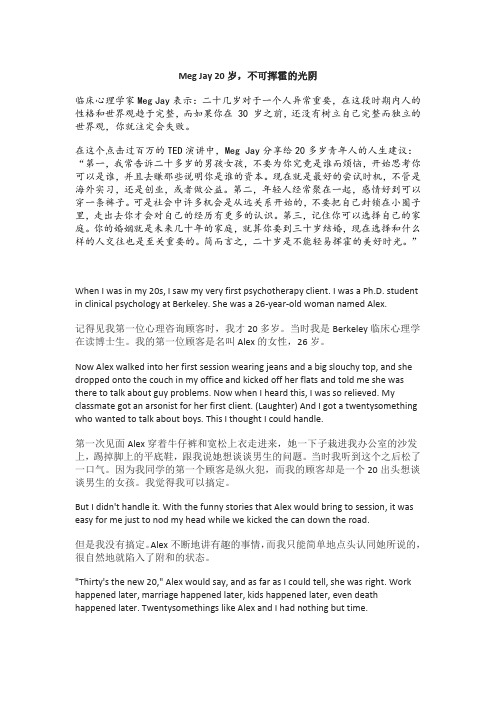
Meg Jay 20岁,不可挥霍的光阴临床心理学家Meg Jay表示:二十几岁对于一个人异常重要,在这段时期内人的性格和世界观趋于完整,而如果你在 30 岁之前,还没有树立自己完整而独立的世界观,你就注定会失败。
在这个点击过百万的TED演讲中,Meg Jay分享给20多岁青年人的人生建议:“第一,我常告诉二十多岁的男孩女孩,不要为你究竟是谁而烦恼,开始思考你可以是谁,并且去赚那些说明你是谁的资本。
现在就是最好的尝试时机,不管是海外实习,还是创业,或者做公益。
第二,年轻人经常聚在一起,感情好到可以穿一条裤子。
可是社会中许多机会是从远关系开始的,不要把自己封锁在小圈子里,走出去你才会对自己的经历有更多的认识。
第三,记住你可以选择自己的家庭。
你的婚姻就是未来几十年的家庭,就算你要到三十岁结婚,现在选择和什么样的人交往也是至关重要的。
简而言之,二十岁是不能轻易挥霍的美好时光。
”When I was in my 20s, I saw my very first psychotherapy client. I was a Ph.D. student in clinical psychology at Berkeley. She was a 26-year-old woman named Alex.记得见我第一位心理咨询顾客时,我才20多岁。
当时我是Berkeley临床心理学在读博士生。
我的第一位顾客是名叫Alex的女性,26岁。
Now Alex walked into her first session wearing jeans and a big slouchy top, and she dropped onto the couch in my office and kicked off her flats and told me she was there to talk about guy problems. Now when I heard this, I was so relieved. My classmate got an arsonist for her first client. (Laughter) And I got a twentysomething who wanted to talk about boys. This I thought I could handle.第一次见面Alex穿着牛仔裤和宽松上衣走进来,她一下子栽进我办公室的沙发上,踢掉脚上的平底鞋,跟我说她想谈谈男生的问题。
TED英语演讲稿:二十岁是不可以挥霍的光阴

三一文库()/演讲致辞/英语演讲稿TED英语演讲稿:二十岁是不可以挥霍的光阴5天内超过60万次浏览量的最新ted演讲“二十岁一去不再来”激起了世界各地的热烈讨论,资深心理治疗师megjay分享给20多岁青年人的人生建议:(1)不要为你究竟是谁而烦恼,去赚那些说明你是谁的资本。
(2)不要把自己封锁在小圈子里。
(3)记住你可以选择自己的家庭。
meg说:“第一,我常告诉二十多岁的男孩女孩,不要为你究竟是谁而烦恼,开始思考你可以是谁,并且去赚那些说明你是谁的资本。
现在就是最好的尝试时机,不管是海外实习,还是创业,或者做公益。
第二,年轻人经常聚在一起,感情好到可以穿一条裤子。
可是社会中许多机会是从远关系开始的,不要把自己封锁在小圈子里,走出去你才会对自己的经历有更多的认识。
第三,记住你可以选择自己的家庭。
你的婚姻就是未来几十年的家庭,就算你要到三十岁结婚,现在选择和什么样的人交往也是至关重要的。
简而言之,二十岁是不能轻易挥霍的美好时光。
”这段关于20岁青年人如何看待人生的演讲引起了许多ted 粉丝的讨论,来自tedx组织团队的davidwebber就说:meg 指出最重要的一点便是青年人需要及早意识到积累经验和眼界,无论是20岁还是30岁,都是有利自己发展的重要事。
”wheniwasinmy20s,isawmyveryfirstpsychotherapycl ient.iwasaph.d.studentinclinicalpsychologyatbe rkeley.shewasa26-year-oldwomannamedalex.记得见我第一位心理咨询顾客时,我才20多岁。
当时我是berkeley临床心理学在读博士生。
我的第一位顾客是名叫alex的女性,26岁。
nowalexwalkedintoherfirstsessionwearingjeansan dabigslouchytop,andshedroppedontothecouchinmyo fficeandkickedoffherflatsandtoldmeshewastheret otalkaboutguyproblems.nowwheniheardthis,iwasso relieved.myclassmategotanarsonistforherfirstcl ient.(laughter)andigotatwentysomethingwhowante dtotalkaboutboys.thisithoughticouldhandle.第一次见面alex穿着牛仔裤和宽松上衣走进来,她一下子栽进我办公室的沙发上,踢掉脚上的平底鞋,跟我说她想谈谈男生的问题。
《不可挥霍的光阴》
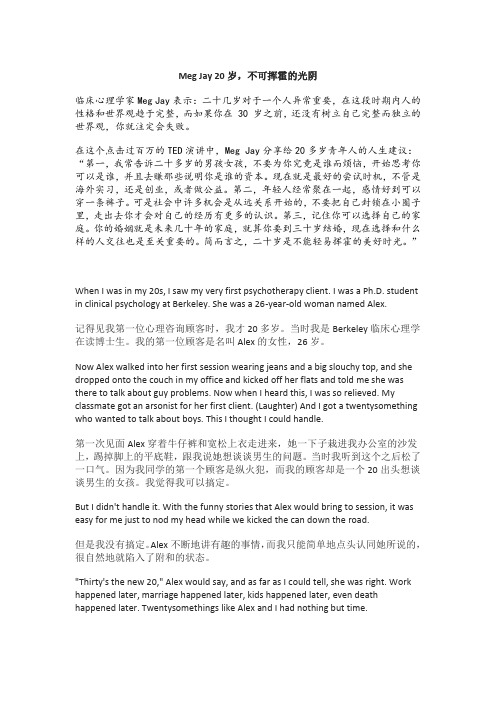
Meg Jay 20岁,不可挥霍的光阴临床心理学家Meg Jay表示:二十几岁对于一个人异常重要,在这段时期内人的性格和世界观趋于完整,而如果你在 30 岁之前,还没有树立自己完整而独立的世界观,你就注定会失败。
在这个点击过百万的TED演讲中,Meg Jay分享给20多岁青年人的人生建议:“第一,我常告诉二十多岁的男孩女孩,不要为你究竟是谁而烦恼,开始思考你可以是谁,并且去赚那些说明你是谁的资本。
现在就是最好的尝试时机,不管是海外实习,还是创业,或者做公益。
第二,年轻人经常聚在一起,感情好到可以穿一条裤子。
可是社会中许多机会是从远关系开始的,不要把自己封锁在小圈子里,走出去你才会对自己的经历有更多的认识。
第三,记住你可以选择自己的家庭。
你的婚姻就是未来几十年的家庭,就算你要到三十岁结婚,现在选择和什么样的人交往也是至关重要的。
简而言之,二十岁是不能轻易挥霍的美好时光。
”When I was in my 20s, I saw my very first psychotherapy client. I was a Ph.D. student in clinical psychology at Berkeley. She was a 26-year-old woman named Alex.记得见我第一位心理咨询顾客时,我才20多岁。
当时我是Berkeley临床心理学在读博士生。
我的第一位顾客是名叫Alex的女性,26岁。
Now Alex walked into her first session wearing jeans and a big slouchy top, and she dropped onto the couch in my office and kicked off her flats and told me she was there to talk about guy problems. Now when I heard this, I was so relieved. My classmate got an arsonist for her first client. (Laughter) And I got a twentysomething who wanted to talk about boys. This I thought I could handle.第一次见面Alex穿着牛仔裤和宽松上衣走进来,她一下子栽进我办公室的沙发上,踢掉脚上的平底鞋,跟我说她想谈谈男生的问题。
- 1、下载文档前请自行甄别文档内容的完整性,平台不提供额外的编辑、内容补充、找答案等附加服务。
- 2、"仅部分预览"的文档,不可在线预览部分如存在完整性等问题,可反馈申请退款(可完整预览的文档不适用该条件!)。
- 3、如文档侵犯您的权益,请联系客服反馈,我们会尽快为您处理(人工客服工作时间:9:00-18:30)。
TED演讲:二十岁是不可以挥霍的光阴----WORD文档,下载后可编辑修改----下面是小编收集整理的范本,欢迎您借鉴参考阅读和下载,侵删。
您的努力学习是为了更美好的未来!TED演讲:二十岁是不可以挥霍的光阴5天内超过60万次浏览量的最新TED演讲“二十岁一去不再来”激起了世界各地的热烈讨论,资深心理治疗师 Meg Jay分享给20多岁青年人的人生建议:(1)不要为你究竟是谁而烦恼,去赚那些说明你是谁的资本。
(2)不要把自己封锁在小圈子里。
(3)记住你可以选择自己的家庭。
Meg说:“第一,我常告诉二十多岁的男孩女孩,不要为你究竟是谁而烦恼,开始思考你可以是谁,并且去赚那些说明你是谁的资本。
现在就是最好的尝试时机,不管是海外实习,还是创业,或者做公益。
第二,年轻人经常聚在一起,感情好到可以穿一条裤子。
可是社会中许多机会是从远关系开始的,不要把自己封锁在小圈子里,走出去你才会对自己的经历有更多的认识。
第三,记住你可以选择自己的家庭。
你的婚姻就是未来几十年的家庭,就算你要到三十岁结婚,现在选择和什么样的人交往也是至关重要的。
简而言之,二十岁是不能轻易挥霍的美好时光。
”这段关于20岁青年人如何看待人生的演讲引起了许多TED粉丝的讨论,来自TEDx组织团队的David Webber就说:Meg指出最重要的一点便是青年人需要及早意识到积累经验和眼界,无论是20岁还是30岁,都是有利自己发展的重要事。
” 以下是Meg的演讲:TED演讲:二十岁是不可以挥霍的光阴以下是Meg的演讲内容:When I was in my 20s, I saw my very first psychotherapy client. I was a Ph.D. student in clinical psychology at Berkeley. She was a 26-year-old woman named Alex.记得见我第一位心理咨询顾客时,我才20多岁。
当时我是Berkeley临床心理学在读博士生。
我的第一位顾客是名叫Alex的女性,26岁。
Now Alex walked into her first session wearing jeans and a big slouchy top, and she dropped onto the couch in my office and kicked off her flats and told me she was there to talk about guy problems. Now when I heard this, I was so relieved. My classmate got an arsonist for her first client. (Laughter) And I got a twentysomething who wanted to talk about boys. This I thought I could handle.第一次见面Alex穿着牛仔裤和宽松上衣走进来,她一下子栽进我办公室的沙发上,踢掉脚上的平底鞋,跟我说她想谈谈男生的问题。
当时我听到这个之后松了一口气。
因为我同学的第一个顾客是纵火犯,而我的顾客却是一个20出头想谈谈男生的女孩。
我觉得我可以搞定。
But I didn't handle it. With the funny stories that Alex would bring to session, it was easy for me just to nod my headwhile we kicked the can down the road.但是我没有搞定。
Alex不断地讲有趣的事情,而我只能简单地点头认同她所说的,很自然地就陷入了附和的状态。
"Thirty's the new 20," Alex would say, and as far as I could tell, she was right. Work happened later, marriage happened later, kids happened later, even death happened later. Twentysomethings like Alex and I had nothing but time.Alex说:“30岁是一个新的20岁”。
没错,我告诉她“你是对的”。
工作还早,结婚还早,生孩子还早,甚至死亡也早着呢。
像Alex和我这样20多岁的人,什么都没有但时间多的是。
But before long, my supervisor pushed me to push Alex about her love life. I pushed back. I said, "Sure, she's dating down, she's sleeping with a knucklehead, but it's not like she's going to marry the guy." And then my supervisor said, "Not yet, but she might marry the next one. Besides, the best time to work on Alex's marriage is before she has one."但不久之后,我的导师就要我向Alex的感情生活施压。
我反驳说:“当然她现在正在和别人交往,她现在和一个傻瓜男生睡觉,但看样子她不会和他结婚的。
” 而我的导师说:“不着急,她也许会和下一个结婚。
但修复Alex婚姻的最好时期是她还没拥有婚姻的时期。
”That's what psychologists call an "Aha!" moment. That was the moment I realized, 30 is not the new 20. Yes, people settle down later than they used to, but that didn't make Alex's 20s a developmental downtime.这就是心理学家说的“顿悟时刻”。
正是那个时候我意识到,30岁不是一个新的20岁。
的确,和以前的人相比,现在人们更晚才安定下来,但是这不代表Alex就能长期处于20多岁的状态。
That made Alex's 20s a developmental sweet spot, and we were sitting there blowing it. That was when I realized that this sort of benign neglect was a real problem, and it had real consequences, not just for Alex and her love life but for the careers and the families and the futures of twentysomethings everywhere.更晚安定下来,应该使Alex的20多岁成为发展的黄金时段,而我们却坐在那里忽视这个发展的时机。
从那时起我意识到这种善意的忽视确实是个问题,它不仅给Alex本身和她的感情生活带来不良后果,而且影响到处20多岁的人的事业、家庭和未来。
There are 50 million twentysomethings in the United States right now. We're talking about 15 percent of the population, or 100 percent if you consider that no one's getting through adulthood without going through their 20s first.现在在美国,20多岁的人有五千万,也就是15%的人口,或者可以说所有人口,因为所有成年人都要经历他们的20多岁。
Raise your hand if you're in your 20s. I really want to see some twentysomethings here. Oh, yay! Y'all's awesome. If you work with twentysomethings, you love a twentysomething, you're losing sleep over twentysomethings, I want to see -- Okay. Awesome, twentysomethings really matter.如果你现在20多岁,请举手。
我很想看到有20多岁的人在这里。
哦,很好。
如果你和20多岁的人一起工作,你喜欢20多岁的人,你因为20多岁的人辗转难眠,我想看到你们。
很棒,看来20多岁的人确实很受重视。
So I specialize in twentysomethings because I believe that every single one of those 50 million twentysomethings deserves to know what psychologists, sociologists, neurologists and fertility specialists already know: that claiming your 20s is one of the simplest, yet most transformative, things you can do for work, for love, for your happiness, maybe even for the world.因此我专门研究20多岁的人,因为我坚信这五千万的20多岁的人,每一个人都应该去了解那些心理学家、社会学家、神经学家和生育专家已经知道的事实:你的20多岁是极简单却极具变化的时期之一。
你20多岁的时光决定了你的事业、爱情、幸福甚至整个世界。
This is not my opinion. These are the facts. We know that 80 percent of life's most defining moments take place by age35. That means that eight out of 10 of the decisions and experiences and "Aha!" moments that make your life what it is will have happened by your mid-30s.这不是我的看法。
